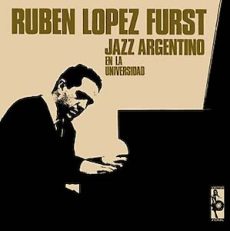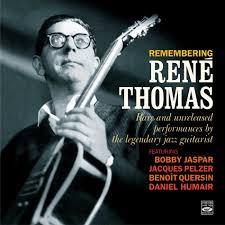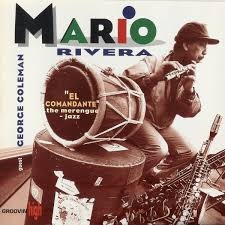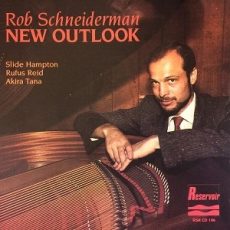
Daily Dose Of Jazz…
Rubén “Baby” López Fürst was born July 26, 1937 in Buenos Aires, Argentina. From the age of five he studied music and piano, and was soon attracted to jazz. In 1951 the 14 year old Ruben got the nickname Baby from the other musicians because he was a child. He made his debut on the jazz scene performing at the concerts organized by the Hot Club de Buenos Aires.
In 1953 Baby played in a string ensemble led by the López Fürst brothers who performed a jazz concert at the Provincial Hotel in the city of Mar del Plata, Argentina. With his brother Héctor on banjo and him on piano they created the Hot Jammers group and made two 78-single records for Victor. He went on to be part of the Dixie band, The Picking Up Timers.
In 1957 the big succes of Oscar Alemán inspired Baby to leave the piano and take up the guitar, trying to emulate one of his idols: Django Reinhardt. Then began regular performances with a string-group named the Blue Strings. It was a quartet in the vein of gypsy string swing.
Modern jazz captivated him in 1959, when he listened to Gerry Mulligan at the Hot Club de Montevideo in Uruguay. Trying to play those new sounds, in 1962 he joined the modern group of pianist Sergio Mihanovich. On the two albums recorded in 1962, the work began Argentine cool jazz with saxophonist Leandro “Gato” Barbieri, Sergio Mihanovich on piano, drummer Osvaldo “Pichi” Mazzei, trumpeter Rubén Barbieri, Oscar López Ruiz on electric guitar, Rubén López Furst on piano, Domingo Cura on percussion, Osvaldo Bissio vibráphone, and baritone saxophonist Julio Darré.
Fürst is one of the most important pianists in the history of Argentinean jazz and opted to stay in Buenos Aires and make a name for himself at home unlike his counterparts Barbieri and Lalo Schiffrin. He played for over 20 years, mainly with his own trio or quartet.
The hard bop musician also formed a swing group. Pianist and guitarist Baby Fürst, whose primary influences were Teddy Wilson and Bill Evans, died on July 26, 2000 at the age of 63 in Buenos Aires.
More Posts: bandleader,guitar,history,instrumental,jazz,music,piano

Daily Dose Of Jazz…
Benoît Quersin was born in Brussels, Belgium on July 24, 1927 into a family with a classical tradition. He met personalities like the composer Béla Bartókor and the pianist Stefan Askenaseat at a very young age. Shortly before the war, he discovered jazz secretly in his bedroom while listening to the records of Fats Waller and Louis Armstrong, then Belgian jazz bandleader Fud Candrix.
His beginnings as a musician were with the kids in his Brussels neighborhood. At the Liberation, Quersin set up his first orchestra. In 1947 he hired Jean Thielemans, who later became known as Toots, with whom he played for some time. He abandoned the piano for the double bass and obtained his first engagements. Toots took him to the Paris, France festival at a time when the headliners were Charlie Parker and Miles Davis.
Moving to Paris in 1950 he played and recorded with Sidney Bechet, Lionel Hampton, Sarah Vaughan, Dizzy Gillespie, Chet Baker, Lucky Thompson, Zoot Sims, Lee Konitz, Jimmy Gourley, Blossom Dearie, Mary Lou Williams, Kenny Clarke, and Jonah Jones among others. The French musicians were Stéphane Grappelli, Maurice Vander, Barney Wilen, Henri Renaud, René Urtreger, Sacha Distel, and Martial Solal, the Belgians were René Thomas, Bobby Jaspar, Francy Boland, Leo Mouse, Jacques Pelzer, and Jack Sels.
Returning to Belgium in 1957 he opened a jazz club in Brussels, the Blue Note, where people like Lou Bennett, Jackie McLean, Martial Solalor and Marc Moulin. In 1961, Quersin became host of jazz programs on Belgium radio RTB and interviewed Charles Mingus, Thelonious Monk, Ray Charles, Fats Domino and John Coltrane. Late in life he became an ethno-musicologist, passionate about world civilizations and the music of West and Central Africa, and collected traditional music from the Mbam ethnic group inCameroon. He would go on tomove to Zaire, Democratic Reublic of Congo and release several albums of traditional instruments.
Double bassist Benoît Quersin, who was an important double bassist on the international jazz scene during the 1950s and Sixties, died on May 31, 1992 in Vaison-la-Romaine, France.
More Posts: bass,ethnomusicology,history,instrumental,jazz,music

Daily Dose Of Jazz…
Emmett Berry was born on July 23, 1915 in Macon, Georgia and began to study classical trumpet, but by 18 had switched to jazz and moved to New York City. Becoming a member of Fletcher Henderson’s band he later replaced Roy Eldridge as soloist.
In the 1940s he worked in Eldridge’s Little Jazz Trumpet Ensemble. He also played in Count Basie’s band. He is known as an accompanist for Billie Holiday, was in the photograph known as A Great Day in Harlem, and the special The Sound of Jazz.
He recorded 39 albums as a sideman with Buck Clayton, Johnny Hodges, Sammy Price, Jimmy Rushing, Cannonball Adderley, Count Basie, Sidney Bechet, Ruby Braff, Bobby Donaldson, Dizzy Gillespie, Edmond Hall, Coleman Hawkins, Fletcher Henderson, Claude Hopkins, Jo Jones, Red Prysock, Buddy Rich, Pee Wee Russell, Maxim Saury, Buddy Tate, Joe Williams, and Jimmy Witherspoon.
Trumpeter Emmett Berry, who also played flute, piano, vibraphone, congas, and drums, died in Cleveland, Ohio on June 22, 1993.
More Posts: history,instrumental,jazz,music,trumpet

Daily Dose Of Jazz…
Mario Rivera was born on July 22, 1939 in Santo Domingo, Dominican Republic and learned to play during his childhood. Moving to New York City in 1961 at 22 he started working with singer Joe Valle as his accompanist. He spent two years with bandleader Tito Rodríguez. During his career he worked with Mongo Santamaria, Eddie Palmieri, and Machito.
From the 1970s to the 1990s he worked with Tito Puente. Both appeared in the films Calle 54 and The Mambo Kings. In 1988 he became a member of the United Nations Orchestra led by Dizzy Gillespie. He was also a member of the Afro-Cuban Jazz Band led by Chico O’Farrill. His only solo album, El Commandante, was released in 1996.
He recorded seventy-six albums as a sideman with Willie Colon, Cheo Feliciano, Dizzy Gillespie, Kip Hanrahan, Conrad Herwig, Giovanni Hidalgo, Chico O’Farrill, Eddie Palmieri, Tito Puente, Tito Rodriguez, Típica 73, Africando, Alfredo “Chocolate” Armenteros, Soledad Bravo, George Coleman, Junior Cook, Rafael Cortijo, Tito Gomez, Jerry Gonzalez, Juan Luis Guerra, La Lupe, Machito, Arturo O’Farrill, Pat Patrick, Bobby Paunetto, Daniel Ponce, Louie Ramirez, Paquito D’Rivera, Alfredo Rodriguez, Mongo Santamaria, Laba Sosseh, Juan Pablo Torres, Stanley Turrentine, Dave Valentin, Fernando Villalona, and Pete Yellin.
Saxophonist Mario Rivera, who also played trumpet, flute, piano, vibraphone, congas, and drums, died from cancer on August 10, 2007 in New York City.
More Posts: bandleader,congas,drums,flute,history,instrumental,jazz,music,piano,saxophone,trumpet,vibraphone

Daily Dose Of Jazz…
Robert Roland “Rob” Schneiderman was born in Boston, Massachusetts on June 21, 1957. He began professional jazz career in San Diego, California around the age of 16, when he played piano for visiting soloists such as Eddie Harris, Sonny Stitt, Harold Land, Charles McPherson and Peter Sprague. He continued to collaborate intermittently with Harris, until the latter’s death in 1996, and with McPherson.
In 1982, Rob moved to New York City, where he performed and toured with J.J. Johnson, Chet Baker, Art Farmer, Clifford Jordan, James Moody and Zoot Sims. A performance fellowship from the National Endowment for the Arts in 1987 featured him with George Coleman, Jimmy Heath, Claudio Roditi, and Slide Hampton. The collaboration with Slide Hampton resulted in his debut album New Outlook, the first of ten recordings to date as a leader for the Reservoir label.
Schneiderman has played as sidemen for Billy Higgins, Rufus Reid, Brian Lynch, Ralph Moore, Peter Washington, Lewis Nash, Akira Tana, Billy Hart, Gary Smulyan and Ben Riley.
As a jazz educator, he has been in residence at the Stanford Jazz Workshop. He was an adjunct professor in the jazz departments of William Paterson University with Rufus Reid and Queens College with Jimmy Heath. He has also been on the faculty of the Jazzschool in Berkeley, California.
Pianist Rob Schneiderman, who also works as a professor and chair of mathematics at Lehman College of the City University of New York, continues to perform and record.
More Posts: bandleader,history,instrumental,jazz,music



